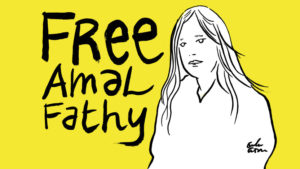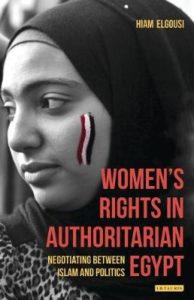 An Egyptian court on Saturday handed down a suspended two-year sentence against Amal Fathy, a female activist convicted of insulting employees at a bank and using abusive language to criticize state institutions, The AP reports.
An Egyptian court on Saturday handed down a suspended two-year sentence against Amal Fathy, a female activist convicted of insulting employees at a bank and using abusive language to criticize state institutions, The AP reports.
In early May, Fathy posted a video to Facebook that described how she had been sexually harassed at a bank. She also criticized living conditions in Egypt more generally and discussed issues of sexual harassment at large, claiming the government does not do enough to protect women from this type of aggressive behavior, The Washington Post adds:
The video circulated widely online and was picked up by some media outlets. Days later, police arrived at her house to arrest her. Since then, she has spent more than 140 days in prison, and allegations against her have grown to include claims she belongs to a terrorist organization. Reuters reported she was a member of the April 6 youth movement, an activist group that is now banned.
 The Observatory for the Protection of Human Rights Defenders said that it is “extremely concerned by the sentencing and ongoing arbitrary detention of Ms. Fathy and by her deteriorating health conditions.” The Observatory “urges the Egyptian authorities to immediately and unconditionally release Ms. Fathy, drop all charges against her and, in the meanwhile, to ensure that she has immediate and unhindered access to adequate health care and to a psychologist.”
The Observatory for the Protection of Human Rights Defenders said that it is “extremely concerned by the sentencing and ongoing arbitrary detention of Ms. Fathy and by her deteriorating health conditions.” The Observatory “urges the Egyptian authorities to immediately and unconditionally release Ms. Fathy, drop all charges against her and, in the meanwhile, to ensure that she has immediate and unhindered access to adequate health care and to a psychologist.”
It is hard to discern truth in Egypt these days. President Abdel-Fattah al-Sisi’s government is opaque, and there are few independent journalists to question it, The Economist observes:
Mr Sisi ought to be comfortable. He won a second term in March with 92% of the vote. After years of stagnation, the economy is growing at 5.3% a year. A new capital city is rising in the eastern desert. Energy firms have discovered vast reservoirs of natural gas. Tourists are coming back. Security has improved, even in the restive Sinai peninsula. Though the constitution says Mr Sisi cannot serve another term, his allies in parliament want to remove the limit. They will probably succeed. “There will be a lot of noise, and then nothing,” says Anwar Sadat, a former MP.
 In a congressional hearing in December, Carnegie analyst Michele Dunne, a board member of the National Endowment for Democracy, quoted a World Bank report saying that the government is spending its funds on big projects, such as the enlargement of the Suez Canal or the new administrative capital in the desert, UPI reports. Those projects do not create jobs and serve only as a means for the army to make money.
In a congressional hearing in December, Carnegie analyst Michele Dunne, a board member of the National Endowment for Democracy, quoted a World Bank report saying that the government is spending its funds on big projects, such as the enlargement of the Suez Canal or the new administrative capital in the desert, UPI reports. Those projects do not create jobs and serve only as a means for the army to make money.
You do not have to be popular to run an authoritarian state, but it helps to have the support of the elite, The Economist adds:
Business leaders are nervous. Some of Mr Sisi’s media allies are murmuring. Sami Anan, a former army chief arrested for mounting a brief presidential campaign, now languishes in hospital, his health failing. “For a general to be treated this way, it’s unthinkable,” says a Western diplomat. “[Sisi] has made a lot of enemies.”







